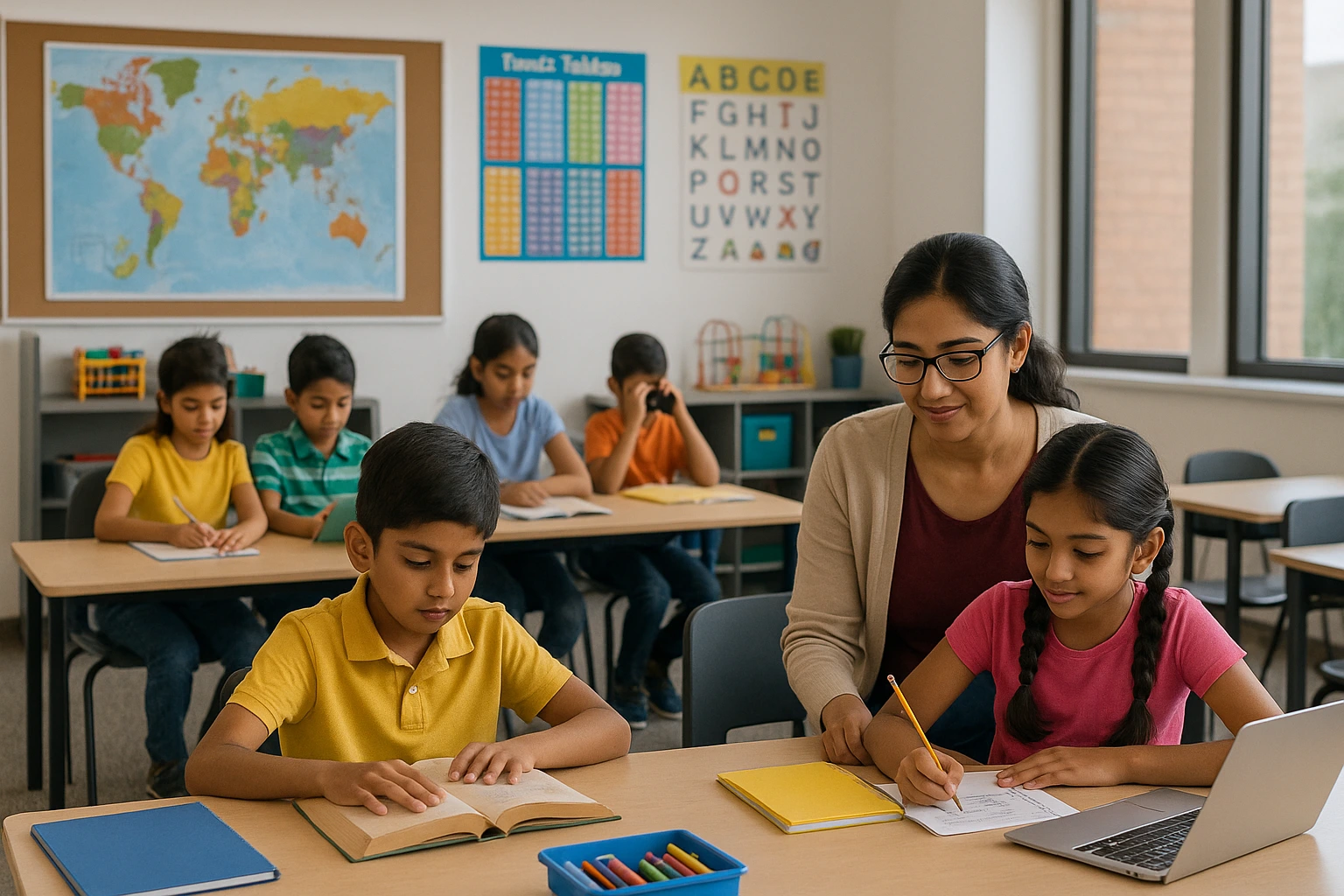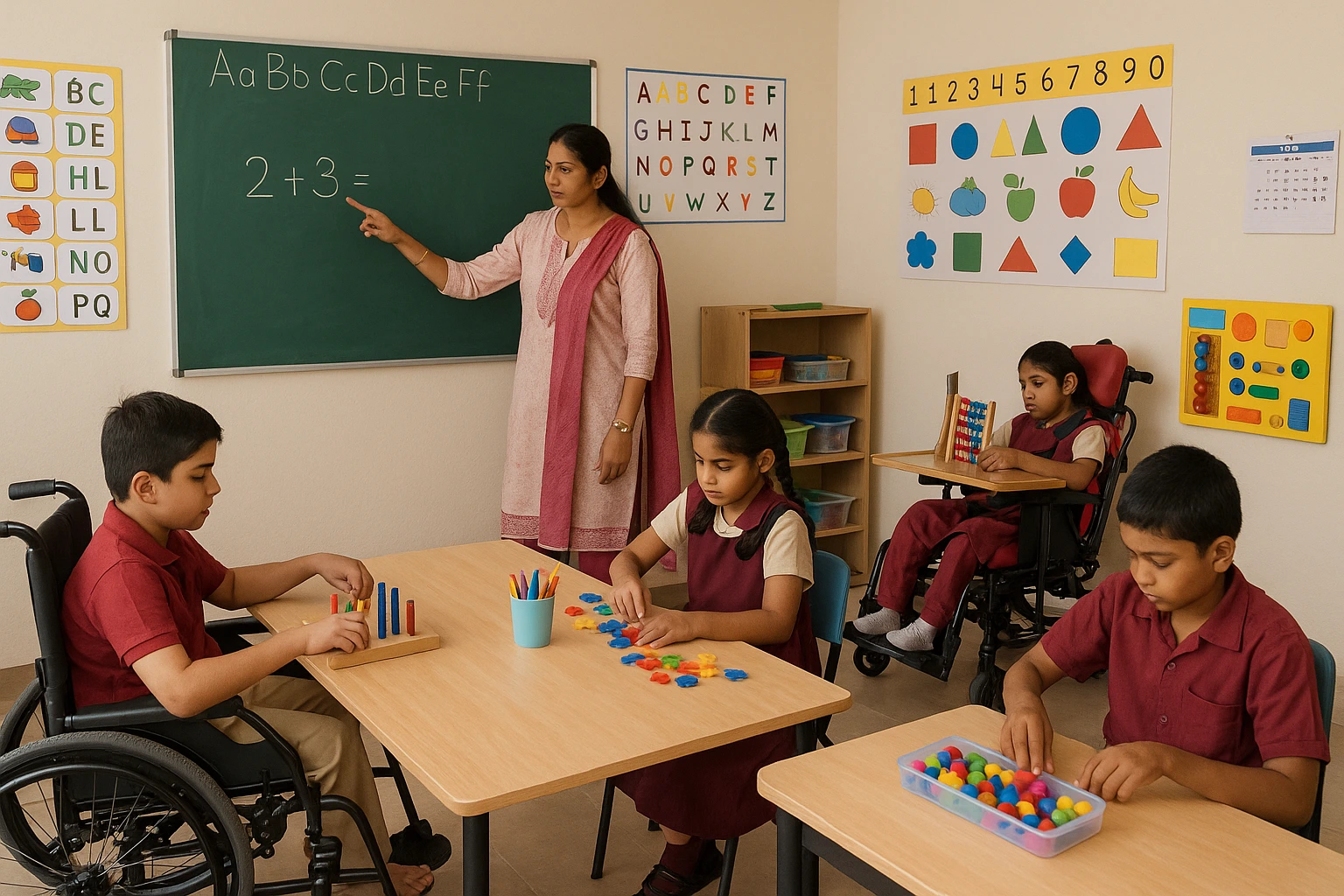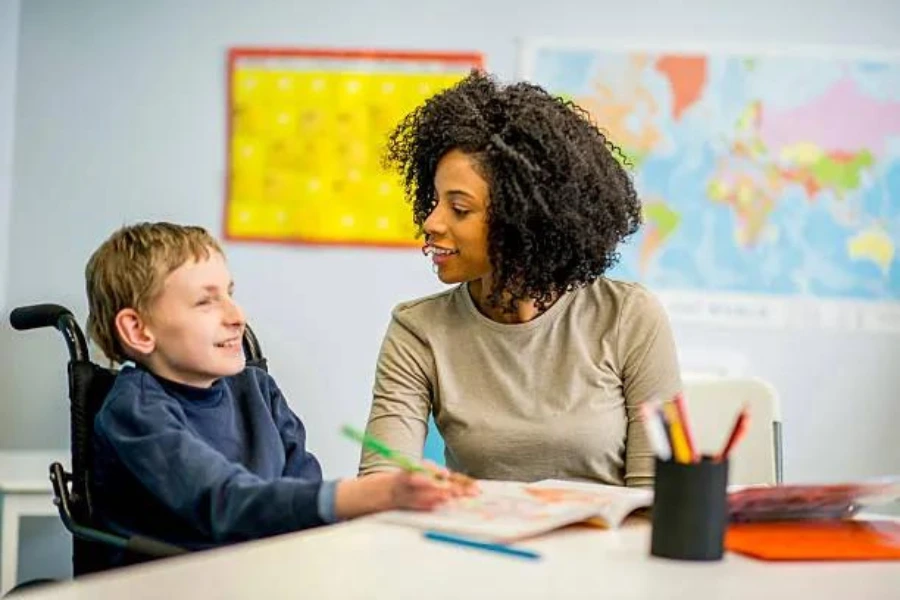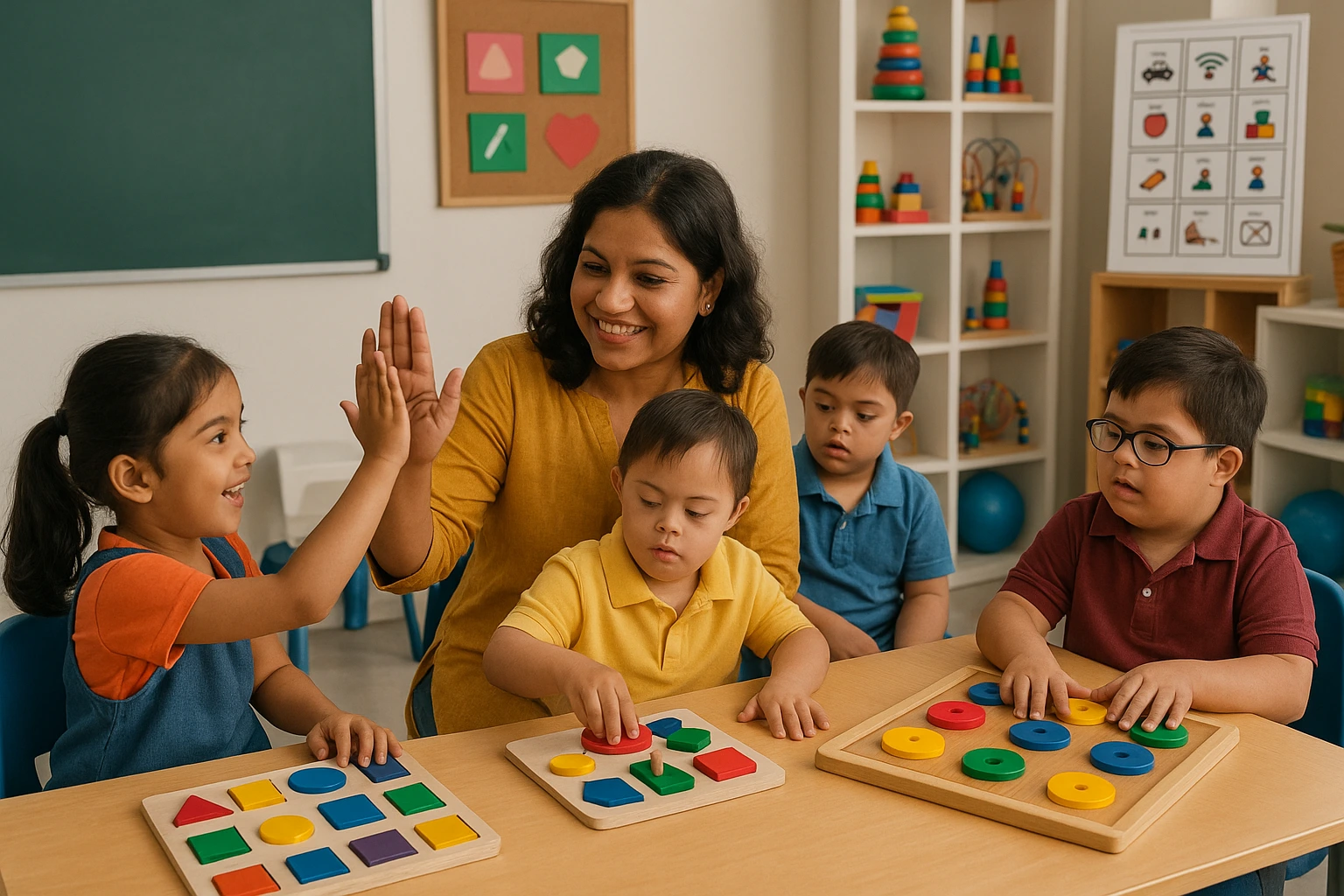
Every child is distinct, which implies that they are all one of their kind with varied strengths, weaknesses, and learning needs. As every child develops at their own pace, the mainstream classroom will have students with wide-ranging learning paces. Due to certain learning impairments, there are cases where children fail to process information as the rest of the students, leading to slower academic progress. To address these academic gaps, Special Education Classes are a must. Special Education Classes are devised to particularly address the real problem areas of the child that are deterring them from being completely involved in the mainstream classroom.
Special Education Classes help to create a positive learning environment, fostering a spirit of positivity and conducive learning, helping children strive hard to achieve their potential, leading wholesome academic journeys.
What is the Meaning of a Special Student in School?
The meaning of “Special Student” in school implies a child who requires guided assistance by a trained professional educator to understand concepts related to maths and language literacy. Due to their learning difficulties, their ways of processing information are poor, leading to poor academic progress. These students are highly intelligent and possess unique talents, but they face challenges in respective areas that need to be addressed by means of customized instruction, tools, or atmospheres to succeed in their educational journey.
To download the brochure about the SEN Course, Click Here!
For more details on the SEN Course, Call/WhatsApp at +919321024137 / +919869866277
Special students may include:
Students with Physical Impairments
This category includes students with physical impairments who cannot access the physical surroundings, behavioural issues due to faulty neurological processing, such as ADHD Students need one-to-one attention and support to be a part of the mainstream classroom.
Students with specific learning disorders
This category comprises students who possess specific learning disorders, either in maths, language literacy skills, for e.g, Dyslexia, Dysgraphia. These students need specifically curated strategies that target the areas of concern, such as reading, writing, or attention.
Gifted students
Though they perform above grade level, gifted learners also fall under the umbrella of special students because they need enriched or accelerated programs to stay engaged and challenged in school.
Sensory processing issues and communication problems
This section includes students whose language skills are not developed fully, leading to speech difficulties. Also, students who face difficulties in responding appropriately to sensory receptance are included here.
Offering appropriate help to a special student is possible only when there is a formal diagnosis of the child’s learning disorder. Therefore, early identification of learning difficulties helps educators, teachers, and parents to collaborate to provide the child with academic aid and guidance that supports their academic and personal growth.
It helps to ensure that each child, irrespective of their diverse needs, features, and backgrounds, gets a full-fledged chance to receive quality education under a single classroom.
Special students are not differentiated by their disabilities but by their learning journeys that require knowledge and assistance.

What is considered a Special Class?
A structured setting that is curated meticulously to cater to the diverse learning needs of children with special needs is considered a “Special Class.” A Special Class is a strong reinforcement approach that ensures that children understand the topics that are already covered once in the mainstream classroom. A Special Class will contribute to the child’s academic progress by implementing customized teaching methods and structured learning environments.
What defines a Special Class?
Target Population
Special classes serve students with disabilities such as intellectual disabilities, autism spectrum disorder, learning disabilities, communication disorders, hearing or visual impairments, and other health-related challenges.
Instructional Approach
Lessons in special classes are tailored to suit each student’s learning pace and ability. This individualized instruction helps address specific academic or behavioral goals.
Structured Environment
Special Classes maintain a proper working schedule that helps children get rid of their anxiety to anticipate what is next. When they follow a schedule, it helps them feel secure, enabling them to focus well.
Specialized Support Services
Special Classes have a team of professionals, such as occupational therapists, speech therapists, and behavioural consultants, who work as per the needs of the students.
Integration vs. Self-Contained
Special classes can exist within regular schools, allowing some interaction with general education peers. In some cases, they are entirely self-contained, with students receiving instruction separately.
Special Classes endeavours to meet the unique learning needs of special children, instilling in them a confidence to achieve their learning goals, raising their self-esteem, and encouraging them or be an active part of a regular classroom. Special Classes apply various teaching pedagogies combined with tech-aided tools that support the child’s learning and enhance their learning experiences. Special classes aim to lay down a foundation for a flexible and multi-disciplinary teaching approach supporting each learner.

Source: istockphoto
Who needs Special Education?
Special education is designed for students who need exclusively devised instruction to help children process information appropriately. Their unique ways of information intake deter them from engaging completely in the classroom, due to their lagging behind in their academic journeys. Special Children need learning models that focus on their strengths, helping them achieve academic success and social success.
Who needs Special Education?
Students with ASD / ADHD neurological disorders
This includes students who possess ASD or ADHD neurological issues that affect their functioning, which can be handled effectively with the help of the following systematic schedules and consistent emotional support.
Children with Specific learning Difficulties
This category includes children who possess learning difficulties that affect their learning skills related to maths, literacy, and writing for e.g., dyslexia, dysgraphia. Students need specific strategic expertise to develop these skills, reducing academic pressures.
Students with intellectual disabilities
They might exhibit below-average cognitive functioning and require support with understanding, processing, and using information.
Students with communication and speech disorders
Students with developmental delays related to speech and communication are included here. Due to the failure to achieve some speech-related developmental milestones, children cannot express themselves freely, which requires speech-related therapies and language impairment.
Students with physical or sensory disabilities
This encompasses students with visual, hearing, or mobility-related disabilities. The use of special equipment, modified materials, and an adjusted mode of instruction can be used effectively to assist in accessing the learning process.
Students with health impairments
Chronic health issues, such as epilepsy or ADHD, can negatively affect a child’s ability to attend to tasks and function in an academic context, so educational services become critical.
Special education permits the inclusion of students with disabilities in a way that provides equity in opportunities to learn and grow. Supports can be individualized to account for each student through thoughtfully planned educational opportunities.

What is it like to teach a Special Class?
Anticipation, tolerance, adaptability, and adequate skill in using diverse strategies based upon a student’s needs are important to enhance their learning. The Special Education Needs Course, developed by Vidhyanidhi Education Society (Govt. Regd.)and designed with the active teacher in mind, will help teachers manage the education of students with Special Educational Needs (SEN). The Special Educational Needs Course provides strategies for inclusion in the classroom, practical ways to develop individualised education plans, and practical ways to include students with SEN in the classroom. Anyone aspiring to teach a special class should consider joining this Special Education Needs Course to build a strong foundation.
Key aspects of teaching a special class:
Personalised attention
Teachers make a proper note of the child’s learning styles and accordingly modify their teaching methods to suit the child’s learning preferences and their pace of learning, ensuring each child understands the topic thoroughly.
Coordinated Professional efforts
Various stakeholders, such as occupational therapists, speech therapists, and counsellors, work alongside the special educators to ensure that the different developmental domains are being taken care of for the child’s holistic progress.
Behavior Management
When there is proper decorum and discipline in the classroom, it raises the productivity of the classroom; therefore, teachers must implement appropriate behavioural reinforcement techniques for enhancing learning outcomes.
Emotional Support
Establishing trust and emotional relationships is crucial. Students can require extra support and encouragement to feel safe and confident.
Progress Monitoring
Tracking growth through regular assessments and observations helps in adjusting teaching methods and goals.
Communication with Families
Regular updates and teamwork with parents help reinforce learning and ensure consistent support.
Teaching a special class requires commitment, empathy, and the right training—qualities that the Special Education Needs Course by Vidhyanidhi Education Society (Govt. Regd.) aims to instill in every educator.
Join Vidhyanidhi Education Society’s SEN Course Today! Support Growth, Spark Potential, Transform Lives!
To download the brochure about the SEN Course, Click Here!
For more details on the SEN Course, Call/WhatsApp at +919321024137 / +919869866277
FAQs
What is it like to be in a Special Needs Class?
A Special Needs Class is a thoughtfully designed learning space supporting the learning of children with special needs, promoting flexible and comfortable learning.
How does Special Education exist in Schools?
Special education comprises individualized instruction, therapy services, and organized routines that are tailored to address every student's individualized learning requirements.
Who are assigned to Special Ed Classes?
Students are put in Special Ed classes when they have learning disabilities, developmental delay, physical impairments, or one of the spectrum of Autism Cases that require extra help.



